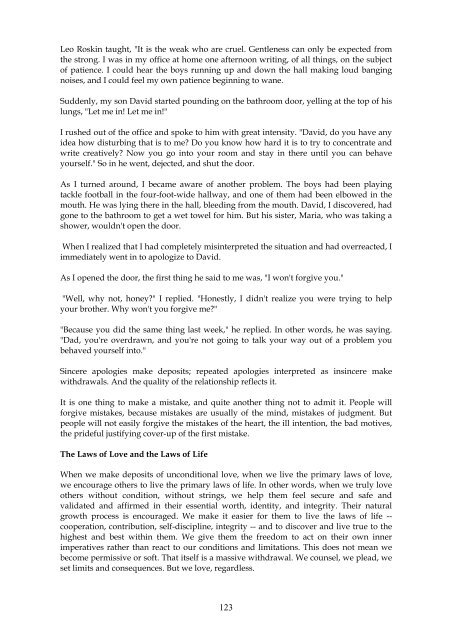Covey - The 7 habits of highly effective people
Create successful ePaper yourself
Turn your PDF publications into a flip-book with our unique Google optimized e-Paper software.
Leo Roskin taught, "It is the weak who are cruel. Gentleness can only be expected from<br />
the strong. I was in my <strong>of</strong>fice at home one afternoon writing, <strong>of</strong> all things, on the subject<br />
<strong>of</strong> patience. I could hear the boys running up and down the hall making loud banging<br />
noises, and I could feel my own patience beginning to wane.<br />
Suddenly, my son David started pounding on the bathroom door, yelling at the top <strong>of</strong> his<br />
lungs, "Let me in! Let me in!"<br />
I rushed out <strong>of</strong> the <strong>of</strong>fice and spoke to him with great intensity. "David, do you have any<br />
idea how disturbing that is to me? Do you know how hard it is to try to concentrate and<br />
write creatively? Now you go into your room and stay in there until you can behave<br />
yourself." So in he went, dejected, and shut the door.<br />
As I turned around, I became aware <strong>of</strong> another problem. <strong>The</strong> boys had been playing<br />
tackle football in the four-foot-wide hallway, and one <strong>of</strong> them had been elbowed in the<br />
mouth. He was lying there in the hall, bleeding from the mouth. David, I discovered, had<br />
gone to the bathroom to get a wet towel for him. But his sister, Maria, who was taking a<br />
shower, wouldn't open the door.<br />
When I realized that I had completely misinterpreted the situation and had overreacted, I<br />
immediately went in to apologize to David.<br />
As I opened the door, the first thing he said to me was, "I won't forgive you."<br />
"Well, why not, honey?" I replied. "Honestly, I didn't realize you were trying to help<br />
your brother. Why won't you forgive me?"<br />
"Because you did the same thing last week," he replied. In other words, he was saying.<br />
"Dad, you're overdrawn, and you're not going to talk your way out <strong>of</strong> a problem you<br />
behaved yourself into."<br />
Sincere apologies make deposits; repeated apologies interpreted as insincere make<br />
withdrawals. And the quality <strong>of</strong> the relationship reflects it.<br />
It is one thing to make a mistake, and quite another thing not to admit it. People will<br />
forgive mistakes, because mistakes are usually <strong>of</strong> the mind, mistakes <strong>of</strong> judgment. But<br />
<strong>people</strong> will not easily forgive the mistakes <strong>of</strong> the heart, the ill intention, the bad motives,<br />
the prideful justifying cover-up <strong>of</strong> the first mistake.<br />
<strong>The</strong> Laws <strong>of</strong> Love and the Laws <strong>of</strong> Life<br />
When we make deposits <strong>of</strong> unconditional love, when we live the primary laws <strong>of</strong> love,<br />
we encourage others to live the primary laws <strong>of</strong> life. In other words, when we truly love<br />
others without condition, without strings, we help them feel secure and safe and<br />
validated and affirmed in their essential worth, identity, and integrity. <strong>The</strong>ir natural<br />
growth process is encouraged. We make it easier for them to live the laws <strong>of</strong> life --<br />
cooperation, contribution, self-discipline, integrity -- and to discover and live true to the<br />
highest and best within them. We give them the freedom to act on their own inner<br />
imperatives rather than react to our conditions and limitations. This does not mean we<br />
become permissive or s<strong>of</strong>t. That itself is a massive withdrawal. We counsel, we plead, we<br />
set limits and consequences. But we love, regardless.<br />
123


